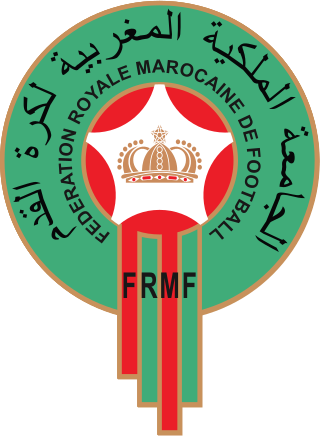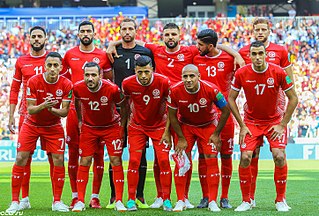Related Research Articles

The Africa Cup of Nations commonly referred to as the TotalEnergies Africa Cup of Nations for sponsorship reasons, or simply AFCON or CAN, is the main international men's association football competition in Africa. It is sanctioned by the Confederation of African Football (CAF) and was first held in 1957. Since 1968, it has been held every two years, switching to odd-numbered years in 2013.

The Egypt national football team, nicknamed "Pharaohs", represents Egypt in men's international football, and is governed by the Egyptian Football Association (EFA), the governing body of football in Egypt.

The Morocco national football team represents Morocco in men's international football, and is controlled by the Royal Moroccan Football Federation, the governing body for football in Morocco.

The Tunisia national football team represents Tunisia in men's international association football. The team is a member of both FIFA and CAF, the Confederation of African Football. It is governed by the Tunisian Football Federation, founded in 1957. Colloquially known as the Eagles of Carthage, the team's colours are red and white, and the bald eagle is its symbol. Most of Tunisia's home matches are played at the Hammadi Agrebi Stadium in Radès since 2001.

The DR Congo National Football Team, recognised by FIFA as Congo DR, represents the Democratic Republic of the Congo in men's international football and it is controlled by the Congolese Association Football Federation. They are nicknamed Les Léopards, meaning The Leopards. The team is a member of FIFA and the Confederation of African Football (CAF).

The Libya national football team represents Libya in men's international association football and it is controlled by the Libyan Football Federation. The team has never qualified for FIFA World Cups in history but has qualified for three Africa Cup of Nations: 1982, 2006, and 2012. In 1982, the team was both the host and runner-up. In the Arab Cup, Libya finished second in 1964 and 2012, and third in 1966. The team is affiliated with both FIFA and Confederation of African Football (CAF).
The 2004 African Cup of Nations, known as the 2004 AFCON or CAN 2004 for short and as the Nokia African Cup of Nations, Tunisia 2004 for sponsorship purposes, was the 24th edition of the biennial African association football tournament organized by the Confederation of African Football hosted in Tunisia from 24 January and 14 February 2004.

The Mozambique national football team represents Mozambique in men's international football competitions and is controlled by the Mozambican Football Federation, the governing body for football in Mozambique. Mozambique have never qualified for a FIFA World Cup, but they have qualified for five Africa Cup of Nations in 1986, 1996, 1998, 2010, and most recently 2023, being eliminated in the first round in all five. In 1997, the Mozambique Football Federation became a founding member of COSAFA.

The Mauritania national football team, nicknamed Al-Murabitun in the reference to Almoravid dynasty, represents Mauritania in men's international football. It is controlled by the Féderation de Football de la République Islamique de Mauritanie, and is a member of the Confederation of African Football. They have not qualified for the FIFA World Cup. However, in the Amílcar Cabral Cup, a regional tournament for West Africa, Mauritania came fourth in 1980 on hosting the competition. The national football team of Mauritania later runners-up in 1995, losing on penalties to Sierra Leone after the final finished 0–0.

The Niger national football team represents Niger in international football through the Nigerien Football Federation, a member of Confederation of African Football (CAF). Niger plays in the colors of the flag of Niger, white, green and orange. Their nickname comes from the Dama gazelle, native to Niger, the Hausa name of which is Meyna or Ménas The Dama appears on their badge in the colors of the national flag.

Mahdi Ben Slimane is a Tunisian former professional footballer who played as a forward.

The Tunisia national women's football team, nicknamed The Eagles of Carthage, is the national team of Tunisia and is controlled by the Tunisian Football Federation. The team competes in the Africa Women Cup of Nations, UNAF Women's Tournament, Arab Women's Championship and the Women's World Cup, which is held every four years.

Youssef Msakni is a Tunisian professional footballer who plays as a winger or forward for Qatar Stars League club Al Arabi, and captains the Tunisia national team.
Sofiane Khabir is a Tunisian footballer. He played in two matches for the Tunisia national football team in 1997. He was also named in Tunisia's squad for the 1998 African Cup of Nations tournament.
Bechir Sahbani is a Tunisian former footballer who played as a defender. He made 30 appearances for the Tunisia national team from 1994 to 1999. He was also named in Tunisia's squad for the 1998 African Cup of Nations tournament.
Sofiane Fekih is a Tunisian former footballer who played as a midfielder. He played in 43 matches for the Tunisia national team from 1994 to 1998. He was also named in Tunisia's squad for the 1998 African Cup of Nations tournament.
Maher Zdiri is a Tunisian footballer. He played in ten matches for the Tunisia national football team from 1993 to 1998. He was also named in Tunisia's squad for the 1998 African Cup of Nations tournament.
Abdelkader Ben Hassen is a Tunisian footballer. He played in 15 matches for the Tunisia national football team from 1995 to 1998. He was also named in Tunisia's squad for the 1996 African Cup of Nations tournament.

The Ligue nationale de football professionnelNational professional football league), commonly known as the LNFP, is a Tunisian governing body that runs the major professional football leagues in Tunisia. It was founded in 1994 and serves under the authority of the Tunisian Football Federation. The president of the league is Mohamed Arbi.

The Tunisia national football team is the national team that represents Tunisia in men's international football, since it played its first match on 2 June 1957 against Libya, which ended with Tunisia winning 4–2. It is a member team of the FIFA internationally and the Confederation of African Football (CAF) on the continent. It is supervised by the Tunisian Football Federation, which was established on 29 March 1957, after Tunisia's independence. Jalel Kadri has been coaching the team since 30 January 2022, accompanied by his assistants Ali Boumnijel and Selim Benachour. The Tunisian national team is nicknamed the Eagles of Carthage, The team's colors are red and white, similar to the colors of the Tunisian flag, and its symbol is the Bald eagle. There have been periods of regular Tunisian representation at the highest international level: from 1962 to 1978, from 1994 to 2008 and again from 2014 onwards. Most of its matches have been played since 2001 at the Stade Hammadi Agrebi which is located in the city of Radès, in the southern suburbs of the capital, Tunis. It has a capacity of 60,000 spectators.
References
- ↑ "Taoufik Hicheri". National Football Teams. Retrieved 1 May 2021.
- ↑ "African Nations Cup 1998 - Final Tournament Details". RSSSF. Archived from the original on 4 March 2016. Retrieved 1 May 2021.
